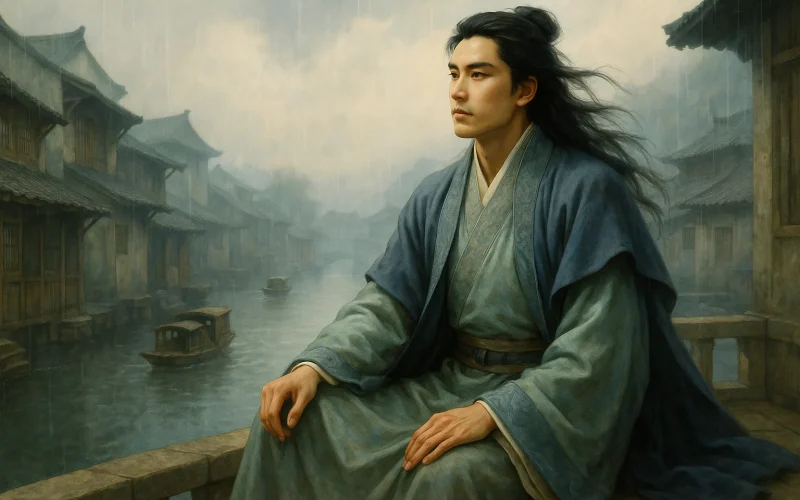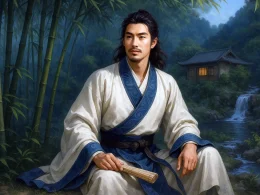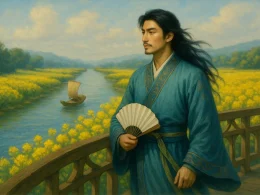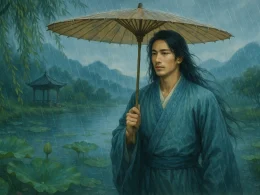Pi Rixiu (皮日休, c. 834–883), courtesy name Ximei or Yishao, was a Late Tang poet and literatus from Xiangyang (present-day Xiangyang, Hubei). He earned the jinshi degree in 867 (Xiantong 8) and served as Taichang Boshi (Court Ritualist) before joining Huang Chao's rebellion as a Hanlin Academician.
His poetry followed Bai Juyi's Xin Yuefu tradition of social critique. Works like Ten Corrective Yuefu Poems and Three Poems of Shame exposed contemporary ills—e.g., The Acorn Gatherer's Lament ("Deep autumn ripens acorns, scattered on bramble slopes") depicted people's suffering. His prose Lumen Essays was trenchant and polemical. Paired with Lu Guimeng as "Pi-Lu," he co-edited the pioneering poetic correspondence anthology Songling Collection.
After the rebellion's failure, he was likely executed. Most works were lost; the Complete Tang Poems preserves 300+ pieces. Lu Xun praised him as "a flash of brilliance and sharpness in a morass of muddle."
Major Works
Life Overview
Pi Rixiu came from an illustrious scholarly family with considerable wealth and received an excellent education in his early years. His erudition and versatile talents, particularly in literature, earned him admiration among intellectuals of his time.
After attaining the jinshi degree, Pi initially held minor positions in the capital. His profound knowledge and literary gifts gradually won him more important roles. However, his blunt speech and uncompromising attitude frequently clashed with powerful officials, even offending key figures in the government, resulting in repeated career frustrations.
Following these setbacks, Pi chose to retreat to the countryside, living a relatively solitary life in Wuzhou. Though this lifestyle was modest, it provided him with greater creative freedom, inspiring numerous poetic works. Despite financial constraints, Pi maintained his moral integrity and independent spirit, often expressing his emotions and thoughts through poetry. His works reflect both his love for pastoral life and sharp critiques of political corruption and social injustice.
In his later years, Pi was recalled to court and reassigned to minor posts. However, due to his advanced age and poor health, his political prospects remained dim, and he eventually resigned to live out his days in seclusion. Pi spent his final years largely in his study until his death.
Pi Rixiu's life was marked by turbulence and adversity, yet he steadfastly upheld his ideals, refusing to yield to authority and maintaining an unyielding, dignified character. His poetry later gained significant recognition in literary history, particularly for its pastoral style, which became highly regarded in Tang poetry.
Literary Style
Pi Rixiu's poetry exhibits distinct personal characteristics, blending the freshness of pastoral verse with satirical and socially critical elements. His works cover a wide range of themes—personal emotions, social customs, natural landscapes—and demonstrate exceptional artistry, especially in conveying reflections on life and critiques of societal inequities. His writing emphasizes lyrical expression, employing plain yet powerful language to depict everyday life with concise strokes while embedding profound insights into human nature and society.
In form, Pi primarily used five- and seven-character regulated verse, often employing balanced parallelism. His poetry frequently features vivid, natural depictions of rural landscapes, imbued with a strong pastoral sensibility. At the same time, his works carry a critical edge, expressing outrage at corrupt officialdom and deep reflections on social injustice.
Beyond poetry, Pi also distinguished himself in ci (lyric poetry), occupying a unique niche in Tang literature. His ci compositions are marked by intense emotional hues, conveying disappointment, resignation, or idealism.
Literary Achievements
Pi Rixiu's literary legacy rests chiefly on his poetry. Through economical language, he articulated profound emotions and philosophical ideas, particularly in politically charged works that reveal his acute awareness of social realities. Later generations praised his poetry as a model of "unconstrained self-expression"—genuine and natural in conveying personal feelings yet fiercely critical when addressing societal issues.
Pi's poetic language is fresh, natural, and succinct, often using simple imagery and delicate descriptions to construct thought-provoking philosophical worlds. Though his works were not widely circulated during his lifetime, later literati held them in high esteem, particularly among pastoral poets who regarded Pi as a pioneering influence.
Moreover, Pi's poetry balances praise for nature with denunciations of social injustice, enriching its thematic diversity. Through his works, later readers encounter the image of an intellectual loyal to his convictions while appreciating the multifaceted complexity of Tang poetry.
Representative Works
Pi Rixiu's oeuvre includes numerous five- and seven-character regulated verses as well as notable ci compositions. Some representative works include:
- "Village Life" (《村居》)
This poem depicts rural existence, reflecting Pi's love for pastoral simplicity and his detachment from urban extravagance. - "Two Poems on Feeling the Cool Night Air Before Dawn by the Fence" (《秋夜将晓出篱门迎凉有感二首》)
Through autumnal nocturnal imagery, the poet conveys solitude and meditations on life, blending natural scenery with philosophical sentiment. - "Roaming Wu River with Friends" (《与友人共游吴江》)
While portraying the beauty of Wu River, this work interweaves the poet's personal reflections, showcasing his pursuit of an idealized life. - "For a Departing Friend" (《赠友人》)
A heartfelt farewell poem marked by sincere emotion and lucid yet profound language.
These works illustrate Pi's dual passion for nature and social consciousness. Stylistically, his poetry is concise and fresh, rich in both philosophical depth and emotional resonance.
Beyond his literary output, Pi's personal integrity and intellectual spirit earned him posthumous acclaim. As a poet unafraid to voice his true convictions, he endured repeated political setbacks yet never abandoned his ideals or creative pursuits, preserving his moral steadfastness. His poetry, nourished by these experiences, brims with social concern and penetrating insights into human nature.
Pi Rixiu's literary contributions influenced later generations, particularly in the realm of pastoral poetry, where he is regarded as a key representative of the Tang pastoral tradition. Simultaneously, his works offer readers an artistic experience of refined elegance, securing his indelible place in literary history.












